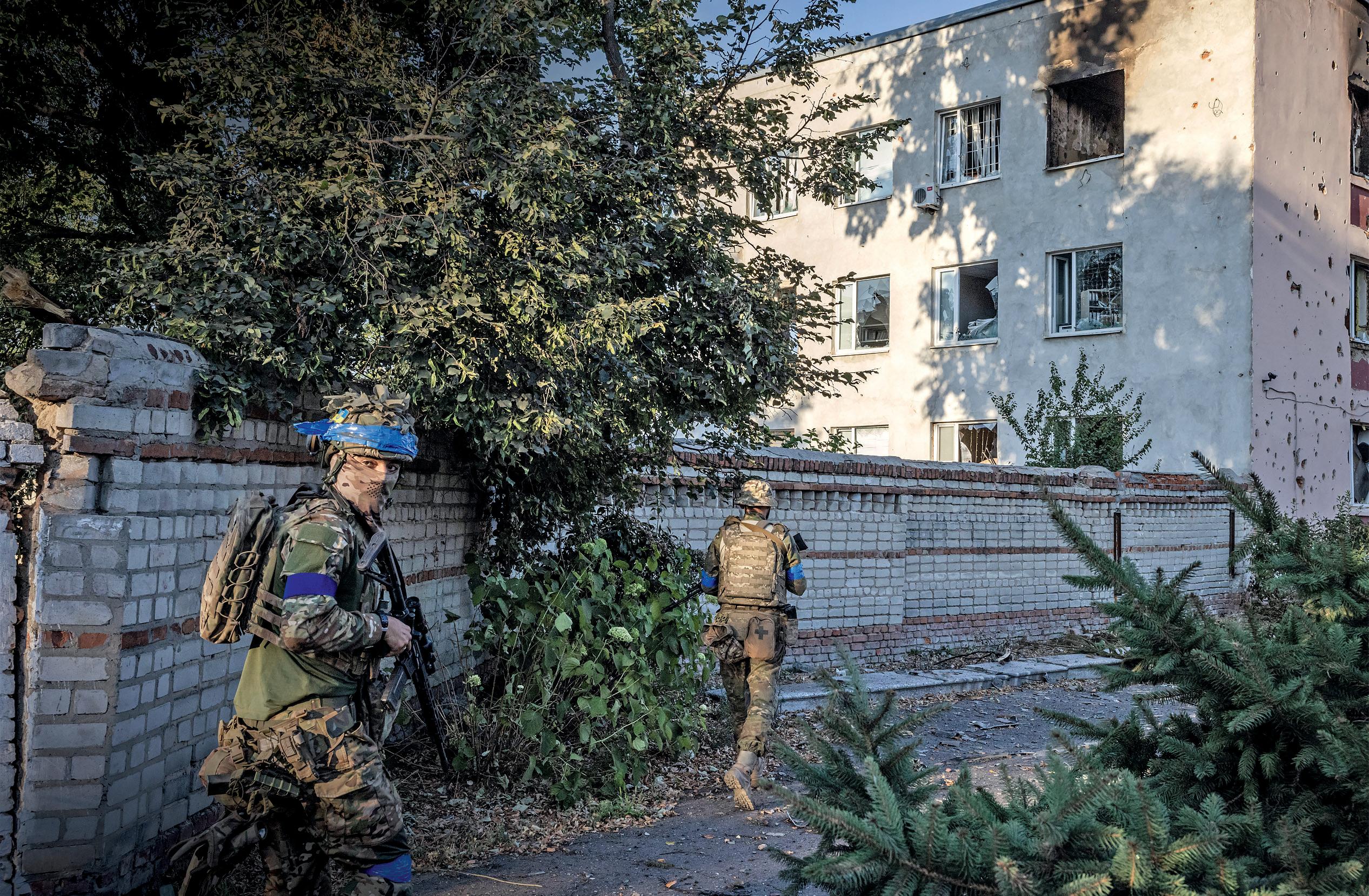Prøve GULL - Gratis
'It was all a blur' Troops tell story of audacious attack
The Guardian Weekly
|September 06, 2024
While the situation in the country's east looks increasingly bleak, the surprise incursion into Russian territory has boosted morale in Kyiv

On a recent morning deep in Ukrainian-occupied Russia, three soldiers from a Ukrainian special operations team jumped into their car, the back windscreen missing after being smashed out the previous day by explosives dropped from a Russian drone, and sped away in the direction of Ukraine.
Six hours later, they would be in Kyiv, together with a precious cargo of documents stashed in boxes piled on the back seat, the fruits of a four-day mission into enemy territory for the trio. The documents included Russian interior ministry papers and military orders, seized from official buildings in Sudzha, the town at the heart of Ukraine's surprise Kursk operation, and from abandoned Russian trenches nearby.
"At the time it was all a blur, it's only later when you come out that you realise where you've just been and what you've been doing," said Artem Kariakin, one of the three, talking just hours after leaving Russian territory.
Ukraine's incursion into Russia, now in its fourth week, was shocking in its audacity, and has laid down an unexpected challenge to the Kremlin. Suddenly, it is Russian flags that are being pulled down from administrative buildings, Russian civilians who are taking shelter as soldiers of a foreign army patrols their streets, and Russia which is scrambling to prove it has control of its own long-established borders.
Even as Ukrainian troops come under sustained pressure on other parts of the frontline, the dash into Russia has provided a much-needed morale boost inside Ukraine, after months of relentlessly bleak news.
"They're in a desperate David versus Goliath battle and this appeals to their rebellious spirit," said one western diplomat in Kyiv, adding that the Kursk operation had boosted the mood among the political elite immeasurably in recent weeks.

Denne historien er fra September 06, 2024-utgaven av The Guardian Weekly.
Abonner på Magzter GOLD for å få tilgang til tusenvis av kuraterte premiumhistorier og over 9000 magasiner og aviser.
Allerede abonnent? Logg på
FLERE HISTORIER FRA The Guardian Weekly
The Guardian Weekly
A bold attempt to convince sceptics that neuroscience has proved Freud was right
Vladimir Nabokov notoriously dismissed the \"vulgar, shabby, and fundamentally medieval world\" of the ideas of Sigmund Freud, whom he called.
3 mins
January 23, 2026
The Guardian Weekly
A fascinating and wideranging account of the good-and the bad-of the new obesity drugs
Few aspects of being human have generated judgment, scorn and conmore demnation than a person's size, shape and weight - particularly if you are female.
1 mins
January 23, 2026

The Guardian Weekly
Can Cuba survive?
Disillusioned with the revolution after 68 years of US sanctions and a shattered economy, one in four Cubans have left the country in the past four years. Now it seems the Trump administration has the regime in its sights and its future is unclear
11 mins
January 23, 2026

The Guardian Weekly
Are our bodies really full of microplastics?
Doubts over whether plastic particles have infiltrated human tissue have grown, with one high-profile study called a 'joke'
5 mins
January 23, 2026

The Guardian Weekly
The team reinventing abortion advice for TikTok age
What do a purple cartoon cat and abortion have in common? Nothing - and that is the point, say the women behind Jacarandas, a Colombian abortion helpline.
3 mins
January 23, 2026

The Guardian Weekly
Talk of The town
Michael Sheen on building a new Welsh National Theatre company, as its first show reimagines an American classic in his homeland
7 mins
January 23, 2026

The Guardian Weekly
Parallel lives
Piet Mondrian found fame with his grid-like paintings. But a reappraisal of little-known British artist Marlow Moss repositions her influence on his work
4 mins
January 23, 2026

The Guardian Weekly
Melting ice brings geopolitical jostling for Arctic assets
Lying between the US and Russia, Greenland has become a critical frontline as global heating opens up the Arctic.
2 mins
January 23, 2026

The Guardian Weekly
Every cent you take?
Sting and his former bandmates have been in court over a royalties dispute-the latest chapter in the song's fractious story
3 mins
January 23, 2026

The Guardian Weekly
Shah's son stakes his claim to lead the country
Reza Pahlavi, the son of Iran’s former pro-western monarch, has predicted the country’s Islamic regime will fall and claimed he is “uniquely” placed to head a successor government.
2 mins
January 23, 2026
Listen
Translate
Change font size

